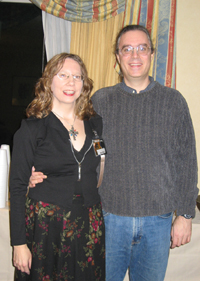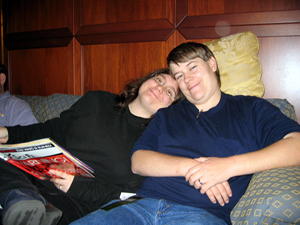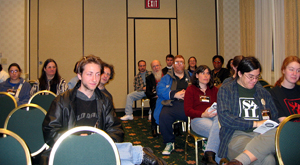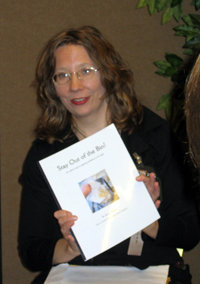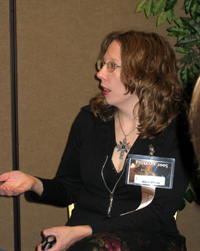Musings
an Online Journal of Sorts
By Alyce Wilson
December 12, 2005 - Mythical Apocalypse
Friday night The Gryphon and I attended the first night of Philcon, the annual science fiction convention in Philadelphia. I was participating on panels having to do with literature and publishing, while The Gryphon was on panels having to do with gaming and anime.
I had chosen an outfit that was a little dressy, more sexy than businesslike. After all, it was evening.
The Gryphon
cooked us a delicious dinner of flounder, millet and vegetables. It was
really good.
After arriving at the Marriott Hotel in Center City, we headed down to the Green Room to get registered and pick up our name tags, program books, and the signs with our names on them that we were supposed to carry around and place in front of us at the panels in which we participated.
Finally, we needed to find a place to stow our winter coats. Philadelphia Area Gaming Enthusiasts (PAGE), has been running a gaming room for a couple years now. The last two years, they'd been downstairs in a room that had cabinets where we could stash our coats. But this year, they were in a larger room off the dealers room with only a table set up in the middle of the room. We were a little nervous about leaving our coats there.
Instead, we stopped in on our friends who run the Con Suite, where con goers can socialize and enjoy snacks. They gladly allowed us to stow the coats on the bed in their personal room. Plus, we knew we wouldn't have trouble finding them later, since they would be in the Con Suite.
I had them take a picture of The Gryphon and I (above), and I took one of them, cuddling on the couch, newlyweds that they are.
Then we had just a little time to kill before our first panels, which were both at 8. I showed up to mine a little bit early, to find one panelist sitting at the table and the chairs already filling in the audience. The panel was "Myth and the 21st Century," and the panelist who greeted me was folklorist/author/editor Josepha Sherman.
I introduced herself to her after she offered me a piece of candy. "Does that mean I get two?" She said sure. They were little sweet and sour fruit candies that appeared all throughout the convention in bowls, probably supplied by the hotel.
Josepha and I chatted while we waited for the other panel members to show up, and she warmed up the audience by joking and chatting with them. Nearly all the chairs filled up, giving us of an audience of, I'd guesstimate 20-25. I snapped a picture of them before we got started, while people were still filing in.
When time came to start, the other panel members, including the moderator, were still missing, so Josepha suggested we start. She became the default moderator, as I was happy to give her the reigns. She had us introduce each other and then each talk a little about the topic at hand.
I spoke primarily about the vampire mythos in popular fiction. I was immensely glad I'd done some research that week to prepare, bringing notes with me of some books which did interesting things with the vampire myth, and refreshing my memory of the history of the vampire in literature, thanks to a wonderful book by Greg Cox, "The Transylvanian Library."
Turns out that Josepha knew Greg Cox, and she told us a funny story about how he had written a book on vampire fiction, "Tomorrow Sucks," blissfully unaware that the Library of Congress listing would show it as "Tomorrow Sucks - Cox."
Turns out that in addition to her copious knowledge about folklore, Josepha knew a lot about the field of publishing as well as being on a first-name basis with some of the very authors I mentioned to her and some of those she mentioned as well.
I have to tell you, after working with her on this panel and seeing two more of her panels throughout the weekend, she is my new hero. I am really impressed not just with the amount of things she does, and does well, but with the easy, natural way that she interacts with both readers and writers. Definitely someone to emulate.
That got us started, and then she talked about her experience in the subject as a folklorist, how myths abound in pop culture and how we create new ones as time passes. Audience members were getting into the conversation, putting up their hands and contributing thoughts about the subject or asking questions.
Closer to the end of the panel, I called on another type of research I'd done, which was by throwing open the subject to a number of my friends, many of whom are SF/fantasy readers, and asking them which authors they'd suggest who use mythology in their works. I shared that list with the audience, which led to another round of comments and suggestions.
In addition, I proposed the idea that pop culture is becoming our modern mythology, as it moves from something that we watch on the screen or read on the page to something we manipulate and change, whether through fandom or fan groups. Josepha agreed with that to some extent but emphasized that oral culture still exists, not just in other nations but in the U.S. As an example, she pointed to the children's playground rhymes and jokes which she'd collected in her book, "Greasy Grimy Gopher Guts."
We had a nice give and take. Even when we disagreed, we argued our points in a good-natured way. Since she had set the tone, we made much use of humor throughout the presentation. It was a great conversation, and the audience seemed really enthusiastic about it.
Afterwards, a quiet guy who'd sat down front, who was dressed all in black and seemed to be in his 20s, came up front and nervously flipped through my poetry chapbook while he asked for my thoughts about pursuing a master's in writing poetry. He said he was already studying for a master's in English but hoped to teach creative writing at a college level.
I told him that the best thing he could do was get published, since that's what they look for when they hired college writing instructors. Still, I emphasized that a master's degree program would greatly improve his writing, if he felt it was something he wanted to do.
It was nice to have some immediate positive feedback from somebody who clearly seemed interested in what I'd had to say. I chatted with him a little while and then gracefully made my exit, telling him I hoped he had a nice convention.
I met up with The Gryphon, who was in the gaming room hanging out with friends. I told him about the panel, and he thought it was great people were so interested. I raved about how well the discussion had gone, even though it was only two of us.
After a short down time, I left for my second and final panel of the evening, "The Impact of Online Magazines on the Genre." The panel consisted of myself, Rob Balder, J.R. Blackwell, Robert Jeschonek, James Patrick Kelly and Mike Pederson, who all had various connections to online publication.
This panel had a very different character to it. For one thing, there were five of us, instead of two. For another, Rob Balder had to step down as moderator because he had to leave early for something else. So James Patrick Kelly, the strongest voice of us all, offered to take over as moderator. We had an audience of about 10-15 people, since we were up against some very popular events.
As the panel got started, The Gryphon took a few pictures of me, at my request, before handing me the camera and leaving to attend something else.
James is a charismatic guy who is very forceful in expressing his ideas. He started us out asking us about the value of online writing for a writer, since there was no money in it.
I talked about how I feel it's important, as a poet, to create a place for poetry in the world, to help people think of it as something that can be part of their every day life, rather than just the big volume of onionskin pages they probably lugged around in English classes. I didn't think the money dimensions was as important to what I was doing.
J.R. Blackwell of 365 Tomorows agreed, saying what was important was getting out your work out there so that people can discover writers. Then they may be interested in purchasing other works or even a print version of online writings.
Mike Pederson talked about how his SF publication, Nth Degree, was initially print only, but that they saw a surge in interest after they began publishing online.
I talked about how online publishing was a good tool for small publishers, who used to have to spend thousands of dollars just to reach a relatively small audience.
Still, James insisted that he didn't know how it was beneficial to a writer's career to publish online. I pointed out that many of Wild Violet's contributors seemed to degree, evidenced the fact that even widely published writers, many of whom are making money from their writing, have been sending us their work.
He even suggested, wryly, that authors could seek sponsorship, offering to work in Coca-Cola into their stories in exchange for some money.
By this point, I wondered if the audience was getting frustrated that we weren't discussing the topic at hand, namely, how fiction was changing due to online publication. So I asked James if that sort of sponsorship was how he felt online publication would change the genre.
That gave others an opening, and J.R. talked about how she felt that it had made flash fiction, of short short stories, 1000 words or less, more popular. She talked about how people were writing more tightly, since their readers were reading it at work.
I suggested that maybe it was readership was changing, as well, because of the different methods people were using to access works.
One of our audience members, Carl Frederick, who was also a Philcon guest, raised his hand and mentioned a book he'd written years ago, which used an interactive setting for readers to experience the book in a visual way, by clicking on various images.
Later, he expressed a frustration, as a writer, that online publications didn't emphasize more clearly who their editors were. To him, it was very important to get a sense of who an editor was and whether he could trust their judgment. I caught up with him the next day and got more of his ideas about this, since Wild Violet is currently undergoing a redesign, and it was an intriguing thought.
When James said he worried that online publication would ruin the genre, since "how much depth and characterization can you get into 1,000 words", I said that sounded like the rhetoric of the apocalypse. Every time a new communications technology comes along, people worry that it will ruin everything. I said this has been happening since the invention of the printing press.
The panel definitely ended up being quite different than I expected, but still some audience members found it interesting. Namely, the front row consisted of J.R.'s partners at 365 Tomorrows. I talked to them a bit afterwards, and J.R. told me that she liked the term "rhetoric of the apocalypse," and that it was exactly what she'd been trying to express. I told her I couldn't take credit, since it came from a mass communications class in college.
In both cases, I was happy with how the panels went. What's more, I got the most difficult panels out of the way early. My Sunday afternoon panel was about the politics of writing workshops, a topic I knew I could discuss in my sleep.
Afterwards, I caught up with The Gryphon. Once we got together, we were both hungry so we went downstairs to the sports bar. I had a crab cake salad and a couple very tasty margaritas.
We returned
to the gaming room and chatted with people before grabbing our coats and
catching a cab home. The first day had gone well for me, and I was happy
with my experience so far.
More from Philcon 2005:
December 13, 2005 - Light Side, Dark Side
December 14, 2005 - Great Conversations
December 19, 2005 - Philcon Fragments
Philcon
2004:
December 14, 2004 - Friendly Philcon Morning
Philcon 2003:
December 15, 2005 - Convention from Another Planet
Moral:
Nothing wins over an audience like humor (but knowledge helps, too).
Copyright
2005 by Alyce Wilson
What
do you think? Share your thoughts
at Alyce's message board (left button):
![]()
![]()
